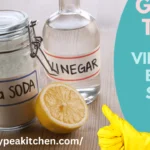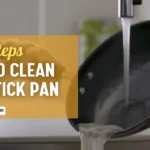Introduction:
Glass cooktops are a stunning addition to any modern kitchen. They are sleek, easy to clean, and add a touch of elegance to your cooking area. However, with regular use, glass cooktops can become scratched and stained over time. Scratches not only make the cooktop look unsightly but also compromise its functionality by trapping dirt and grime in the crevices.
It’s important to note that prevention is always better than cure when it comes to maintaining a clean and scratch-free glass cooktop. Avoid using abrasive cleaners or rough utensils when cooking on your stovetop as this will increase the risk of scratching it in the future. With proper care and maintenance, your glass cooktop will remain flawless for years to come!
Overview of How to get rid of scratches on glass cooktops:
One way is to use a glass cooktop cleaner specifically designed for this purpose. These cleaners contain mild abrasives that can remove light scratches and stains without damaging the surface of the cooktop. Another method is to use baking soda. Mix baking soda with water to make a paste, then apply it to the scratched area using a soft cloth or sponge.
In some cases, if the scratch is too deep or extensive, you may need to replace your glass cooktop entirely. It’s best to consult with a professional before attempting any DIY repairs on your own as improper methods can cause further damage and ultimately cost more in repair expenses.
10 ways How to get rid of scratches on glass cooktops
1. Baking Soda and Water:
Start by cleaning the cooktop with a soft cloth and then mix together equal parts of baking soda and water to form a paste. Apply the paste to the scratched area with a clean, damp cloth, making sure to rub in circular motions. Allow the mixture to sit for several minutes before wiping it off with another clean, damp cloth. Repeat the process as necessary until the scratch is no longer visible or significantly reduced.
2. White Vinegar and Baking Soda:
To use white vinegar and baking soda to remove scratches from a glass cooktop, start by dampening a soft cloth with white vinegar and wiping down the surface of the cooktop. Next, sprinkle some baking soda onto a second cloth or sponge and gently rub it onto the scratched area in circular motions. Rinse off any remaining residue with warm water and dry with a clean cloth.
3. Toothpaste:
To use toothpaste for this purpose, simply apply a small amount of toothpaste onto the scratched area and rub gently using a soft cloth. Make sure to rinse off any excess toothpaste residue afterward.
However, not all types of toothpaste are suitable for this task. Avoid using whitening or gel-based kinds of toothpaste as they may contain ingredients that can harm the surface of your glass cooktop.
4. Car Wax:
Liquid wax is easy to apply and does not require much effort. It can be applied with a foam pad or cloth and then wiped off with a microfiber towel. Paste wax requires more effort but provides better protection than liquid waxes. Spray-on waxes are the easiest to apply but do not offer as much protection as a paste or liquid waxes.
5. Cerium Oxide:
Cerium oxide, also known as ceria, is a rare earth metal oxide that has become popular in recent years for its ability to remove scratches from glass surfaces. It is available in powder form and can be mixed with water or polishing agents to create a slurry that can be applied to the scratched surface using a buffing wheel or pad.
6. Ammonia and Water
To use ammonia and water for cleaning a glass cooktop, first mix one-part ammonia with three parts water in a spray bottle. Then, spray the mixture onto the cooktop and let it sit for five minutes. Afterward, wipe away any residue with a soft cloth.
7. Metal Polish
To use a metal polish, simply apply a small amount of the product onto the scratched area and rub it in using a soft cloth or sponge. Be sure to use gentle pressure and avoid applying too much force, as this could further damage the glass.
8. Bar Keepers Friend:
To use Bar Keepers Friend on a glass cooktop, simply apply the powder directly onto the surface and use a damp cloth or sponge to gently scrub in a circular motion. One of the reasons why Bar Keepers Friend is effective at removing scratches on glass cooktops is because it contains oxalic acid, which helps to dissolve mineral deposits and stains.
9. Glass Cooktop Cleaner:
To use a glass cooktop cleaner, simply apply a small amount of the product onto the affected area and rub gently with a soft cloth or sponge. Be sure to follow the instructions on the label carefully, as some products may require additional steps such as buffing with a dry cloth or rinsing with water.
10. Glass Scratch Repair Kit:
To use a glass scratch repair kit, start by cleaning the affected area thoroughly with soap and water. Then, apply the polishing compound included in the kit onto the scratched area using a soft cloth, working in circular motions. Repeat this process until the scratch is no longer visible. Finally, rinse off any excess polish with clean water and dry your cooktop with a clean towel.
Conclusion:
Glass cooktops are a popular choice among homeowners for their sleek and modern look. However, scratches on the surface can be frustrating and unsightly. Fortunately, there are several methods to remove scratches from glass cooktops.
One of the easiest ways is to use a non-abrasive cleaner and a soft cloth. Simply apply the cleaner to the affected area and buff it with the cloth until the scratch disappears. Another method is to use baking soda and water to form a paste, which can be applied directly to the scratch with a soft cloth. Leave it on for a few minutes before wiping it away with a clean cloth.
It’s important to note that prevention is key when it comes to preserving your glass cooktop’s appearance. Avoid using abrasive cleaners or scrubbers and opt for gentle cleaning solutions instead. Always make sure your pots and pans are clean before placing them on the cooktop as debris or rough edges can cause scratches over time. With these tips in mind, you can keep your glass cooktop looking new for years to come.



